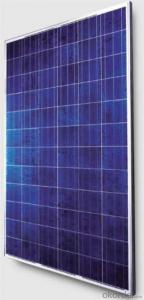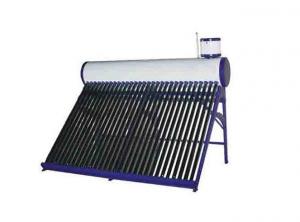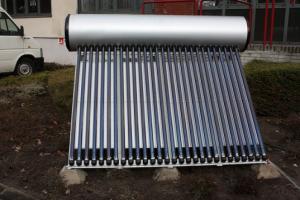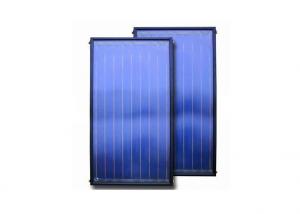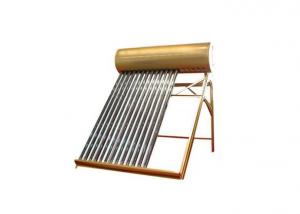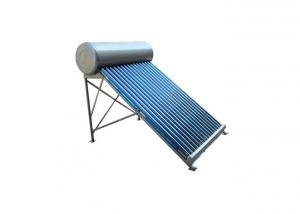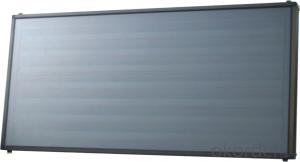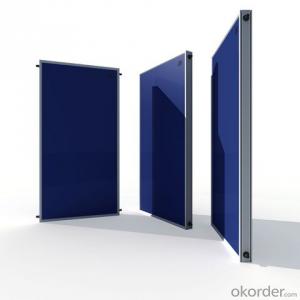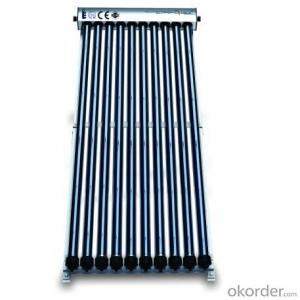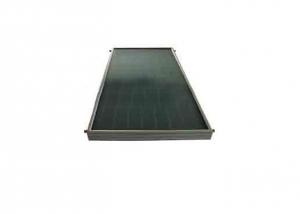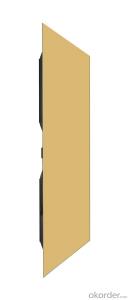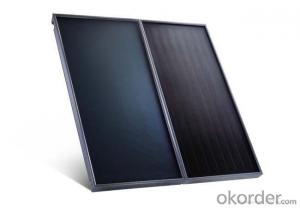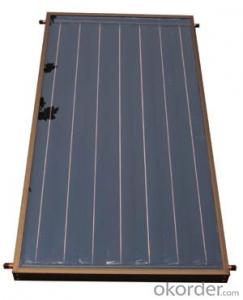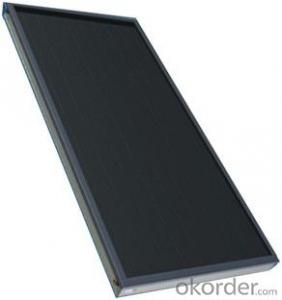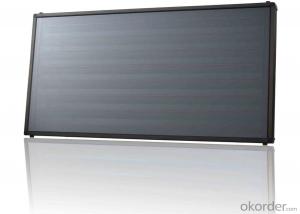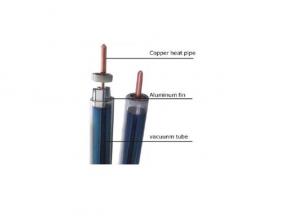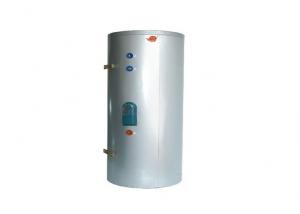CNBM Brand PV Silicon Modules Made in China
- Loading Port:
- Tianjin
- Payment Terms:
- TT OR LC
- Min Order Qty:
- 1 pallet
- Supply Capability:
- 100000000 pallet/month
OKorder Service Pledge
OKorder Financial Service
You Might Also Like
Solar panel refers either to a photovoltaic (PV) module, a solar hot water panel, or to a set of solar photovoltaic modules electrically connected and mounted on a supporting structure. A PV module is a packaged, connected assembly of solar cells. Solar panels can be used as a component of a larger photovoltaic system to generate and supply electricity in commercial and residential applications. Each module is rated by its DC output power under standard test conditions, and typically ranges from 100 to 320 watts. The efficiency of a module determines the area of a module given the same rated output – an 8% efficient 230 watt module will have twice the area of a 16% efficient 230 watt module. There are a few solar panels available that are exceeding 19% efficiency. A single solar module can produce only a limited amount of power; most installations contain multiple modules. A photovoltaic system typically includes a panel or an array of solar modules, an inverter, and sometimes a battery and/or solar tracker and interconnection wiring.
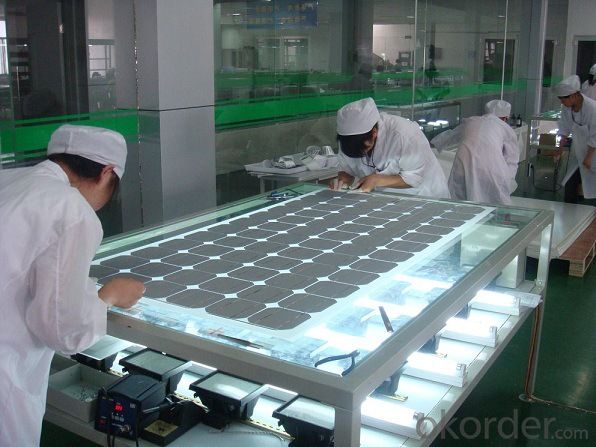
Specifications:
solar panels from 5W--300W, made of TAIWAN MOTECH brand cells,with CO in TAIWAN,Mono and Poly with VDE,IEC,CSA,UL,CE,ISO.
We import solar cells from Taiwan Motech brand, with this CO in taiwan and our CSA certification,we can still sell goods to Anti-dumping areas like USA. Our main products are solar panels, off grid and on grid solar home systems , solar street lighting systems, solar water heating system,solar pump,solar attic fan, solar DC LED lights and solar DC refrigerators.
Certificates : ISO, CE, VDE IEC, MCS, CSA-UL, CEC.
Delivery time: sample 10days, order 25-30days.
Sample: charged.
Payment term: T/T 30% as deposit, 70% before shipment. Or irrevocable L/C at sight.
Trade term: FOB Shenzhen or CIF destination seaport or Airport.
Characteristics:
I.Solar Cell : High efficiency crystalline solar cell. Even if under the weak light, the solar module can produce maximum power output.
II.Tempered glass (toughened glass): Anti-reflecting coating and high transmission rate glass increase the power output and mechanical strength of solar module.
III.EVA and TPT: Using high quality EVA and TPT to prevent destroying and water.
IV.AI frame: Without screw, corner connection. 6 holes on the frame can be installed easily.
V.Junction box: Multi function junction box with water proof.
VI.Long lifetime: ≥25 years; Less power decrease.
VII.Good performance of preventing from atrocious weather such as wind and hails.
VIII.Resisting moisture and etching effectively, not effected by geology.
IX.The certificate issued by international authority: UL, TUV, IEC, VDE, CE.
Quality and Safety
1. Rigorous quality control meets the highest international standards.
2. High-transmissivity low-iron tempered glass, strong aluminium frame.
3. Using UV-resistant silicon.
4. IS09001/14001/CE/TUV/UL
Warranties
1. 10 years limited product warranty
2. 15 years at 90% of the minimal rated power output
3. 25 years at 80% of the minimal rated power output
Technical date :
ITEM NO.: | Poly 156*156 cell ,60pcs . Power range from 230Wp-260Wp | ||||||
Maximum Power(W) | 230 | 235 | 240 | 245 | 250 | 255 | 260 |
Optimum Power Voltage(Vmp) | 29.4 | 29.5 | 29.7 | 30.1 | 30.3 | 30.5 | 30.7 |
Optimum Operatige Current(Imp) | 7.83 | 7.97 | 8.08 | 8.14 | 8.25 | 8.37 | 8.48 |
Open Circuit Voltage(Voc) | 36.7 | 36.8 | 36.9 | 37.1 | 37.3 | 37.5 | 37.7 |
Short Circuit Current(Isc) | 8.52 | 8.59 | 8.62 | 8.65 | 8.69 | 8.73 | 8.78 |
Solar Cell: | 156*156 Poly | ||||||
Number of Cell(pcs) | 6*10 | ||||||
Name of Solar Cells | Polycrystalline Cell | ||||||
Size of Module(mm) | 1650*992*40/45/50 | ||||||
Cable & Connector Type | Pass the TUV Certificate | ||||||
Frame(Material Corners,etc.) | Aluminium-alloy | ||||||
Back sheet | TPT | ||||||
Weight Per Piece(KG) | 19.5KG | ||||||
FF (%) | 70-76% | ||||||
Junction Box Type | Pass the TUV Certificate | ||||||
Tolerance Wattage(e.g.+/-5%) | ±3%, or 0-3% | ||||||
Front Glass Thickness(mm) | 3.2 | ||||||
Temperature Coefficients of Isc(%) | +0.04 | ||||||
Temperature Coefficients of Voc(%) | -0.38 | ||||||
Temperature Coefficients of Pm(%) | -0.47 | ||||||
Temperature Coefficients of Im(%) | +0.04 | ||||||
Temperature Coefficients of Vm(%) | -0.38 | ||||||
Temperature Range | -40°C to +85°C | ||||||
Surface Maximum Load Capacity | 5400Pa | ||||||
Allowable Hail Load | 23m/s ,7.53g | ||||||
Bypass Diode Rating(A) | 12 | ||||||
Warranty | 90% of 10 years, 80% of 25 years. | ||||||
Standard Test Conditions | AM1.5 1000W/ 25 +/-2°C | ||||||
Packing | carton or pallet | ||||||
1*20' | 14 Pallets / 316pcs | ||||||
1*40'STD | 25 Pallets / 700pcs | ||||||
FAQ:
I..Will you focus on the safety of the goods during transportation?
Yes, Safety of the cargo is the primary element that we would consider on transportation.
II..How would guarantee the quality will meet the requirements of your clients?
Before shipment, we will have inspection for each batch of goods.
III..What certificates do you have?
IEC,UL,TUV,CSA,etc.
IV..Can you do OEM according to clients’ requirements?
Yes, we have our own brand while we can provide OEM service.
- Q:Can solar collectors be used for generating electricity on college campuses?
- Yes, solar collectors can certainly be used for generating electricity on college campuses. Solar collectors, also known as solar panels, are designed to convert sunlight into electricity through the photovoltaic effect. College campuses are typically large and have ample rooftop space, making them ideal for installing solar panels. By harnessing the power of the sun, college campuses can significantly reduce their dependence on fossil fuels and lower their carbon footprint. Additionally, solar energy is a renewable source of energy, meaning it is sustainable and does not deplete natural resources. Installing solar collectors on college campuses can provide clean and reliable electricity, contributing to a more sustainable and environmentally friendly campus. Furthermore, colleges can also explore the option of integrating solar collectors into their curriculum, allowing students to learn about renewable energy technologies and gain hands-on experience in the field.
- Q:Are there any safety concerns with solar collectors?
- Yes, there are a few safety concerns associated with solar collectors. Some common concerns include the risk of electric shock during installation or maintenance, overheating of the system, and potential fire hazards due to faulty wiring or improper installation. It is important to follow proper safety protocols, such as hiring trained professionals for installation and regular maintenance, to minimize these risks and ensure safe operation of solar collectors.
- Q:Can solar collectors be used to generate electricity?
- Yes, solar collectors can be used to generate electricity.
- Q:Can solar collectors be used for heating recreational vehicles and boats?
- Yes, solar collectors can be used to heat recreational vehicles and boats. Solar thermal systems can be installed on these vehicles to capture sunlight and convert it into heat, which can then be used for space heating or hot water heating purposes. This renewable energy source is environmentally-friendly, reduces reliance on traditional fuel sources, and can provide cost savings in the long run.
- Q:Can solar collectors be used in areas with limited access to educational resources?
- Yes, solar collectors can be used in areas with limited access to educational resources. Solar collectors are relatively simple to install and operate, requiring minimal technical knowledge. Additionally, there are various online resources and guides available that can provide step-by-step instructions on how to set up and maintain solar collectors. Thus, even in areas with limited access to educational resources, individuals can still learn and benefit from using solar collectors for clean and sustainable energy generation.
- Q:Can solar collectors be used for drying agricultural products?
- Yes, solar collectors can be used for drying agricultural products. Solar collectors can harness the sun's energy and convert it into heat, which can be used to dry various agricultural products such as fruits, vegetables, grains, and herbs. Solar drying is an energy-efficient and cost-effective method that helps preserve the quality and nutritional value of the agricultural products while reducing dependence on fossil fuels.
- Q:Can solar collectors be used to generate electricity during nighttime hours?
- No, solar collectors cannot generate electricity during nighttime hours as they rely on sunlight for energy.
- Q:Can solar collectors be used in areas with limited access to maintenance services?
- Yes, solar collectors can be used in areas with limited access to maintenance services. Solar collectors are generally low-maintenance and require minimal upkeep, making them suitable for remote locations. They have no moving parts and are built to withstand harsh environmental conditions, reducing the need for frequent maintenance. Additionally, advancements in solar technology have made these systems more reliable and efficient, further minimizing the need for regular maintenance.
- Q:Are solar collectors suitable for schools and universities?
- Yes, solar collectors are suitable for schools and universities. Solar collectors, such as solar panels, are an environmentally-friendly and sustainable source of energy. Installing solar collectors in educational institutions like schools and universities can have numerous benefits. Firstly, solar collectors can help educational institutions reduce their carbon footprint and contribute to a greener future. By harnessing the power of the sun, schools and universities can generate clean energy, reducing their reliance on fossil fuels and decreasing greenhouse gas emissions. This aligns with the educational mission of these institutions, teaching students about renewable energy and sustainable practices. Secondly, solar collectors can lead to significant cost savings for schools and universities. Educational institutions typically have large energy demands, with numerous buildings and facilities requiring electricity. By installing solar collectors, these institutions can generate their own electricity, reducing their dependence on the grid and lowering their energy bills. Over time, the cost savings from using solar energy can be substantial, allowing schools and universities to allocate more resources to educational programs and initiatives. Moreover, solar collectors can serve as educational tools themselves. By incorporating solar energy systems into the curriculum, students can learn about renewable energy technology, energy efficiency, and the science behind solar power. This hands-on learning experience can enhance students' understanding of sustainable practices and inspire them to pursue careers in renewable energy or related fields. Additionally, solar collectors can act as a visual representation of an educational institution's commitment to sustainability. By showcasing their use of clean energy, schools and universities can inspire their students, staff, and surrounding community to adopt more environmentally-friendly practices. This can create a culture of sustainability within the institution and contribute to a positive image in the community. In conclusion, solar collectors are highly suitable for schools and universities. They provide a sustainable source of energy, reduce carbon emissions, and lead to significant cost savings. Moreover, they serve as educational tools and promote a culture of sustainability. By embracing solar energy, educational institutions can demonstrate their commitment to a greener future while providing valuable learning opportunities for their students.
- Q:What is the impact of dust or dirt accumulation on the performance of solar collectors?
- Dust or dirt accumulation on the surface of solar collectors can significantly impact their performance. It reduces the amount of sunlight that can reach the solar cells, thereby reducing the efficiency of the collectors in converting sunlight into electricity. This can result in a decrease in power output and overall energy generation. Regular cleaning and maintenance of solar collectors are necessary to ensure optimal performance and maximize energy production.
1. Manufacturer Overview |
|
|---|---|
| Location | |
| Year Established | |
| Annual Output Value | |
| Main Markets | |
| Company Certifications | |
2. Manufacturer Certificates |
|
|---|---|
| a) Certification Name | |
| Range | |
| Reference | |
| Validity Period | |
3. Manufacturer Capability |
|
|---|---|
| a)Trade Capacity | |
| Nearest Port | |
| Export Percentage | |
| No.of Employees in Trade Department | |
| Language Spoken: | |
| b)Factory Information | |
| Factory Size: | |
| No. of Production Lines | |
| Contract Manufacturing | |
| Product Price Range | |
Send your message to us
CNBM Brand PV Silicon Modules Made in China
- Loading Port:
- Tianjin
- Payment Terms:
- TT OR LC
- Min Order Qty:
- 1 pallet
- Supply Capability:
- 100000000 pallet/month
OKorder Service Pledge
OKorder Financial Service
Similar products
New products
Hot products
